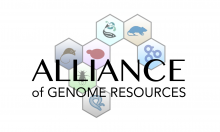SGD Newsletter, December 2023
About this newsletter:
This is the Winter 2023 issue of the SGD newsletter. The goal of this newsletter is to inform our users about new features in SGD and to foster communication within the yeast community. You can view this newsletter as well as previous newsletters, on the SGD Community Wiki.
Contents
- 1 Reference Genome Annotation Update R64.4
- 2 Textpresso updated
- 3 Biochemical Pathways now in SGD Search
- 4 microPublications - latest yeast papers
- 5 Allele SGDIDs added to YeastMine
- 6 Downloads files added to YeastMine
- 7 Chemical structures now on Chemical pages in SGD
- 8 Alliance of Genome Resources - Release 6.0
- 9 Upcoming Conferences and Courses
Reference Genome Annotation Update R64.4
Textpresso updated
Biochemical Pathways now in SGD Search
microPublications - latest yeast papers
microPublication Biology is part of the emerging genre of rapidly-published research communications. We are seeing a strong set of microPublications come through the database and are glad for this venue to publish brief, novel findings, negative and/or reproduced results, and results which may initially lack a broader scientific narrative. Each article is peer-reviewed, assigned a DOI, and indexed through PubMed and PubMedCentral.
Consider microPubublications when you have a result that doesn't necessarily fit into a larger story, but will be of value to others.
Latest yeast microPublications:
- Bennett SA, Cobos SN, Son E, Segal R, Mathew S, Yousuf H, Torrente MP (2023) Impaired RNA Binding Does Not Prevent Histone Modification Changes in a FUS ALS/FTD Yeast Model. MicroPubl Biol 2023
- Chang S, Joyson M, Kelly A, Tang L, Iannotta J, Rich A, Castilho Coelho N, Carvunis AR (2023) Unannotated Open Reading Frame in Saccharomyces cerevisiae Encodes Protein Localizing to the Endoplasmic Reticulum. MicroPubl Biol 2023
- Chen A, Gibney PA (2023) Disruption of GRR1 in Saccharomyces cerevisiae rescues tps1Δ growth on fermentable carbon sources. MicroPubl Biol 2023
- Courtin B, Namane A, Gomard M, Meyer L, Jacquier A, Fromont-Racine M (2023) Xrn1 biochemically associates with eisosome proteins after the post diauxic shift in yeast. MicroPubl Biol 2023
- Delorme-Axford E, Tasmi TA, Klionsky DJ (2023) The Pho23-Rpd3 histone deacetylase complex regulates the yeast metabolic transcription factor Stb5. MicroPubl Biol 2023
- Garcia B, Riley KJ (2023) Saccharomyces cerevisiae NRE1 and IRC24 Encode Paralogous Benzil Oxidoreductases. MicroPubl Biol 2023
- Kowaleski SJ, Hurmis CS, Coleman CN, Philips KD, Najor NA (2023) SHE9 deletion mutants display fitness defects during diauxic shift in Saccharomyces cerevisiae . MicroPubl Biol 2023
- Runnebohm AM, Indovina CJ, Turk SM, Bailey CG, Orchard CJ, Wade L, Overton DL, Snow BJ, Rubenstein EM (2023) Methionine Restriction Impairs Degradation of a Protein that Aberrantly Engages the Endoplasmic Reticulum Translocon. MicroPubl Biol 2023
All yeast microPublications can be found in SGD.
Allele SGDIDs added to YeastMine
Downloads files added to YeastMine
Chemical structures now on Chemical pages in SGD
Alliance of Genome Resources - Release 6.0
The Alliance of Genome Resources, a collaborative effort between SGD and other model organism databases (MOD), released version 6.0 in September 2023.
Version 6.0 adds new features to gene pages:
- New Paralogy section. Similar to Orthology, the Paralogy data are sourced from the DRSC’s DIOPT tool, which lets you view predictions from several tools at one time. Each table is ranked based on similarity, identity, alignment length, and a count of algorithms (methods) used to predict a paralogous match. See human HSPA1A gene page for an example.
- New Sequence Detail section. For different transcripts of the gene, you can choose to view the sequence for the gene, or its CDS, cDNA, protein, gene with collapsed introns, or genomic sequence with or without 500 bp up and downstream.
- Disease Qualifier. The qualifier describes whether a gene may be, for example, a marker_for the onset of a disease, or implicated_in the severity of a disease.
- Disease “Annotation details”. The pop-up for individual table rows has expanded to include Association, Additional Implicated Genes, Genetic Modifiers, Strain Background, Genetic Sex, Notes, and Annotation Type.
- The Download file from the gene page disease table now includes fields for Additional Implicated Gene ID, Additional Implicated Gene Symbol, Gene Association, Genetic Entity Association, Disease Qualifier, Evidence Code Abbreviation, Experimental Conditions, Genetic Modifier Relation, Genetic Modifier IDs, Genetic Modifier Names, Strain Background ID, Strain Background Name, Genetic Sex, Notes, Annotation Type, and Source URL.
- The Source column entries now link back to their respective resource webpages.
Upcoming Conferences and Courses
- TAGC2024 The Allied Genetics Conference
- National Harbor | Washington DC Metro Area
- March 05 to March 10, 2024
- 32nd Fungal Genetics Conference
- Asilomar Conference Grounds, Pacific Grove, CA
- March 12 to March 17, 2024
- 16th Yeast Lipid Conference
- May 29 to May 31, 2024 -
- Saarland University, Homburg, Germany
- JCS2024: Diversity and Evolution in Cell Biology
- June 24 to June 27, 2024 -
- Montanya Hotel & Lodge, Catalonia, Spain
- 39th Small Meeting of Yeast Transporters and Energetics (SMYTE)
- August 28 to September 01, 2024 -
- University of York, York, United Kingdom
- ICY2024: 16th International Congress on Yeasts
- Cape Town International Convention Centre, Cape Town, South Africa
- September 29 to October 03, 2024

